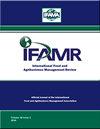Sustainable value creation – a farm case on business model innovation
IF 1.5
4区 经济学
Q3 AGRICULTURAL ECONOMICS & POLICY
International Food and Agribusiness Management Review
Pub Date : 2022-06-23
DOI:10.22434/ifamr2021.0114
引用次数: 0
Abstract
The agricultural sector in Sweden, as elsewhere, is affected by increased intensification and specialisation, leading to fewer and larger farms. The majority of agricultural firms acquire profits by pushing an economies of scale strategy, which is not always possible for small farms. However, there are alternative strategies. This teaching case focuses on a small farm in Sweden and offers students an opportunity to study the management of business model innovation in this context. The case explores the value creation strategy of a cattle farm and applies activities such as mapping a business model, developing suggestions for business model innovation, analysing existing and lacking managerial competences and pinpointing implications for agricultural policy. As a result, profitability, competitiveness and sustainability of the study farm should be achieved, together with acquisition of knowledge and skills by its owner. This educational case is suitable for agricultural students of different levels requiring knowledge of business and management.可持续价值创造——商业模式创新的农场案例
瑞典的农业部门和其他地方一样,受到集约化和专业化程度提高的影响,导致农场数量减少,规模扩大。大多数农业公司通过推行规模经济战略来获取利润,这对小农场来说并不总是可行的。然而,也有其他的策略。本教学案例以瑞典的一个小农场为重点,为学生提供了一个在此背景下研究商业模式创新管理的机会。本案例探讨了养牛场的价值创造战略,并应用了诸如绘制商业模式、为商业模式创新提出建议、分析现有和缺乏的管理能力以及确定对农业政策的影响等活动。因此,应该实现研究农场的盈利能力、竞争力和可持续性,并使其所有者获得知识和技能。本教育案例适合不同层次的农业学生,对商业和管理知识有一定的要求。
本文章由计算机程序翻译,如有差异,请以英文原文为准。
求助全文
约1分钟内获得全文
求助全文
来源期刊

International Food and Agribusiness Management Review
AGRICULTURAL ECONOMICS & POLICY-
CiteScore
2.90
自引率
0.00%
发文量
0
审稿时长
>12 weeks
期刊介绍:
The IFAMR is an internationally recognized catalyst for discussion and inquiry on issues related to the global food and agribusiness system. The journal provides an intellectual meeting place for industry executives, managers, scholars and practitioners interested in the effective management of agribusiness firms and organizations.
IFAMR publishes high quality, peer reviewed, scholarly articles on topics related to the practice of management in the food and agribusiness industry. The Journal provides managers, researchers and teachers a forum where they can publish and acquire research results, new ideas, applications of new knowledge, and discussions of issues important to the worldwide food and agribusiness system. The Review is published electronically on this website.
The core values of the Review are as follows: excellent academic contributions; fast, thorough, and detailed peer reviews; building human capital through the development of good writing skills in scholars and students; broad international representation among authors, editors, and reviewers; a showcase for IFAMA’s unique industry-scholar relationship, and a facilitator of international debate, networking, and research in agribusiness.
The Review welcomes scholarly articles on business, public policy, law and education pertaining to the global food system. Articles may be applied or theoretical, but must relevant to managers or management scholars studies, industry interviews, and book reviews are also welcome.
 求助内容:
求助内容: 应助结果提醒方式:
应助结果提醒方式:


